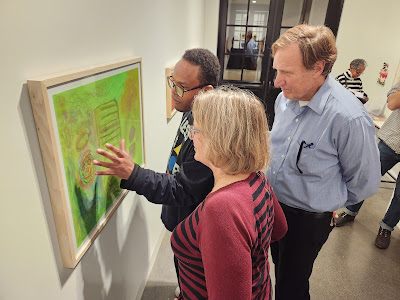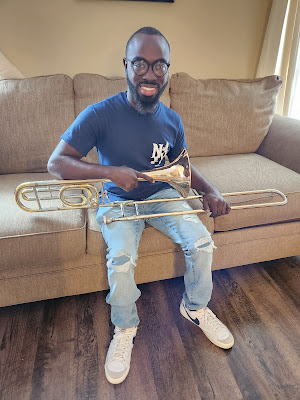 |
| Keilah Jones, 28, took advantage of a Christmas shopping spree that enabled her to take home a boxful of merchandise for her children for a mere $25. Photos by Wiley Henry |
 |
| Tiara Caswell (right), executive director of Legacy Impact Community Resource Center and daughter of Commissioner Charlie Caswell, mingles with shoppers who came out for “Christmas With a Cause.” |
MEMPHIS, TN – When Keilah Jones learned that families with limited resources could shop for pennies on the dollar, she took her two children to Legacy Impact Community Resource Center in the Frayser community on Dec. 16 to take part in “Christmas With a Cause.”
From noon to 4 p.m., parents and their children made their way to the resource center, where thousands of items were available for their choosing and to help make the holiday season a little brighter – particularly for the children. Hosted by Shelby County Commissioner Charlie Caswell Jr. and radio and TV personality Dr. Telisa Franklin, Jones and other parents donated $25 at the door in exchange for merchandise valued at $100 or more. “We are raising funds to finish the renovation of the Legacy Impact Community Resource Center,” said Tiara Caswell, the executive director. She also heads Legacy of Legends Community Development Corporation. The 58,000 sq.ft. facility serves as a hub for resources and houses the Reverend James E. Smith Freedom Fighters Gallery, the Keiya Graves-Garrett Training Academy, the Legacy Impact Performing Arts Center, and more. It is home to other organizations and programs as well. The sponsors of “Christmas With a Cause” included the S.O. What Foundation, Legacy of Legends CDC, Beyond Educating Foundation, I Am She, and Caswell Group Consulting. “I thought this was a very awesome event for kids to be able to get things for Christmas at a very affordable price,” said Jones, 28, an Orange Mound resident and reset teacher for Shelby County Schools. On display were a mix of new shoes, books, jewelry, bicycles, clothes, undergarments, toys, household items, and other merchandise that parents like Jones were all too happy to receive. The merchandise – clearance sales and out-of-season items valued altogether in the thousands – were provided by Walmart, Burlington, Target, and other stores, Caswell pointed out. The public was asked to donate items as well. “We're using this to be able to give our residents in Frayser the opportunity to have brand new items that are conveniently located in their neighborhood and not [sold] at a retail price,” she said. Caswell, 27, is the daughter of Commissioner Caswell, who represents District 6 in Shelby County. He is a pastor, founder and CEO of Legacy of Legends CDC, and a longtime community activist in Frayser. “We understand that Frayser is like the second poorest zip code (38127) in the city of Memphis,” the commissioner said. “And being here for so long, we know there are many struggles that families and children deal with daily.” He said the idea is to help families and to give them hope at Christmas time. “Economically, we know that many people in this community suffer from poverty,” said Commissioner Caswell. “This is a blessing to the community…to be able to give them the capacity to get more for less.” Jones took home a boxful of gifts for her daughter, Cailey Owens, 9, and her 5-year-old son, Cortez Taylor. “It helps me out a lot to get a lot of things at an affordable price,” she said. Caswell reflected on his youth when he and his 16 brothers and sisters went lacking many times at Christmas. “We were such a big family,” he said. “So, I know that feeling on Christmas not to have much.” Copyright 2023 TNTRIBUNE. All rights reserved. |











